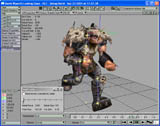|
|
|
| |
|
| |
|
|
| |
 |
|
| |
Looking
Glass Interface
(see examples section)
|
|
|
|
| |
|
| |
|
|
|
|
| |
|
|
|
|
| |
|
|
|
|
| |
|
|
Currently in development, David Wyand's Looking
Glass for the Torque
Engine allows the user to view their DTS objects
to ensure they have been correctly exported. It is presently
being beta tested at major indie game studios. See the
Examples section
for more images.
The current version supports the following, with more
features continually being added:
- Runs on OSX and Windows!
- Loading of multiple DTS objects into their own view.
DSQ files may be loaded individually or through a
standard .cs file to import multiple animation sequences
at once. A list of the last five loaded objects is
available.
- Multiple rendering formats: textured shaded, untextured
shaded, flat shaded, textured wireframe, front face
wireframe, wireframe, vertices, and bounding boxes.
- In addition to the standard perspective view, a
number of orthographic views are available.
- User selectable bitmap for environmental mapping.
- The light source may be moved around with the mouse
in a 'trackball'-like fashion, or turned off for unobstructed
viewing of the applied textures.
- The current texture mip map level may be changed
at any time with a key press. Mip mapping may also
be turned off by locking the current mip map into
place.
- Textures may be flushed and reloaded with a key
press. They may also be reloaded automatically on
a user defined interval. This really helps when creating
and modifying textures in a paint program.
- All material properties are displayed in the Material
List window.
- A user definable grid at 'ground level'
- The view background may be a solid colour (selected
from a list or user defined) or a bitmap. A snapshot
of a game's level could be used as the background.
- All nodes and their parental links may be shown.
- When a node is selected, its world or local position
and rotation are shown as well as a graphical representation
of the node's axis.
- The vertices that are controlled by the selected
node may be displayed, including the amount of influence.
- Individual object bounding boxes (rendered solid
or wireframe) and collision meshes may be displayed.
- Any loaded object may be mounted to any node on
another object.
- Levels of detail may be manually selected or automatically
displayed as they would in game.
- Animation sequences may be played forwards or backwards
at a user defined time scale. The sequence may also
be scrubbed through using the animation slider control.
- All animation sequence attributes may be viewed
using the Sequence Info window.
- View the structure of the DTS object using a tree
view, and save this structure to a file. Useful for
debugging the shape.
- See the rendering structure of your object at each
detail level to determine the order the meshes will
be drawn in.
- Check out how your object will look reskinned using
the same method as found in the TGE.
- Supports texture maps up to 2048x2048, including
alpha.
- Full support for the Synapse Gaming Lighting Pack.
See how your objects will look if you add this product
to your game.
More features are on the way!
|
